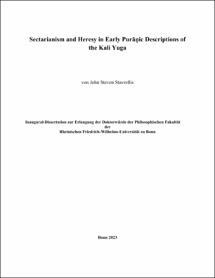Sectarianism and Heresy in Early Purāṇic Descriptions of the Kali Yuga

Sectarianism and Heresy in Early Purāṇic Descriptions of the Kali Yuga

| dc.contributor.advisor | Klaus, Konrad | |
| dc.contributor.author | Stavrellis, John Steven | |
| dc.date.accessioned | 2023-12-28T12:19:39Z | |
| dc.date.available | 2023-12-28T12:19:39Z | |
| dc.date.issued | 28.12.2023 | |
| dc.identifier.uri | https://hdl.handle.net/20.500.11811/11211 | |
| dc.description.abstract | Changes in the meaning of the Sanskrit word “pāṣaṇḍa,” over a period spanning from the height of the Mauryan to the end of the Gupta Empire, mirror the dramatic sociopolitical shifts which, during that same stretch of time, were transforming the face of Hindu religion and the relationship of royal power to religious authority. This period saw sectarian rhetoric from newly ascendant religious groups gradually turn more acrimonious as competition for royal patronage and social influence became increasingly fierce. Why this word should be at the epicenter of worsening relations between religious rivals becomes clear when one considers its most common English gloss: “heretic.” In order to better evaluate the fitness of this translation, however, we must examine the various stages of its semantic history by closely studying instances of its use from Aśoka’s edicts up to the early sectarian Purāṇas. | en |
| dc.language.iso | eng | |
| dc.rights | In Copyright | |
| dc.rights.uri | http://rightsstatements.org/vocab/InC/1.0/ | |
| dc.subject | Häresie | |
| dc.subject | Sanskrit | |
| dc.subject | Indologie | |
| dc.subject | Altertumswissenschaft | |
| dc.subject | Hinduismus | |
| dc.subject | Buddhismus | |
| dc.subject | Jainismus | |
| dc.subject | Indien | |
| dc.subject | Heresy | |
| dc.subject | Indology | |
| dc.subject | Hinduism | |
| dc.subject | Buddhism | |
| dc.subject | Jainism | |
| dc.subject | India | |
| dc.subject.ddc | 950 Geschichte Asiens | |
| dc.title | Sectarianism and Heresy in Early Purāṇic Descriptions of the Kali Yuga | |
| dc.type | Dissertation oder Habilitation | |
| dc.identifier.doi | https://doi.org/10.48565/bonndoc-192 | |
| dc.publisher.name | Universitäts- und Landesbibliothek Bonn | |
| dc.publisher.location | Bonn | |
| dc.rights.accessRights | openAccess | |
| dc.identifier.urn | https://nbn-resolving.org/urn:nbn:de:hbz:5-73671 | |
| ulbbn.pubtype | Erstveröffentlichung | |
| ulbbnediss.affiliation.name | Rheinische Friedrich-Wilhelms-Universität Bonn | |
| ulbbnediss.affiliation.location | Bonn | |
| ulbbnediss.thesis.level | Dissertation | |
| ulbbnediss.dissID | 7367 | |
| ulbbnediss.date.accepted | 15.06.2023 | |
| ulbbnediss.institute | Philosophische Fakultät : Institut für Orient- und Asienwissenschaften (IOA) | |
| ulbbnediss.fakultaet | Philosophische Fakultät | |
| dc.contributor.coReferee | Doney, Lewis | |
| ulbbnediss.contributor.gnd | 1314975900 |
Dateien zu dieser Ressource
Das Dokument erscheint in:
-
E-Dissertationen (702)




